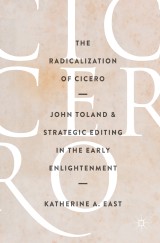Details

The Radicalization of Cicero
John Toland and Strategic Editing in the Early Enlightenment|
CHF 100.50 |
|
| Verlag: | Palgrave Macmillan |
| Format: | |
| Veröffentl.: | 28.06.2017 |
| ISBN/EAN: | 9783319497570 |
| Sprache: | englisch |
Dieses eBook enthält ein Wasserzeichen.
Beschreibungen
<div>This book uses a previously overlooked Neo-Latin treatise, <i>Cicero Illustratus,</i> to provide insight into the status and function of the Ciceronian tradition at the beginning of the eighteenth century, and consequently to more broadly illuminate the fate of that tradition in the early Enlightenment. <i>Cicero Illustratus</i> itself is the first subject for inquiry, mined for what its deliberately erudite and colorfully polemical passages of scholarly stratagems reveal about Ciceronian scholarship and the motives for exploring it within the context of early Enlightenment thought. It also includes an analysis of the role played by the Ciceronian tradition in the broader political and radical movements that existed in the Enlightenment, with particular attention paid to Cicero’s unexpectedly prominent position in major political and philosophical Republican and Erastian works. The subject of this book together with the conclusions reached will provide scholars and students with crucial new material relating to the classical tradition, the history of scholarship, and the intellectual history of the early Enlightenment.</div>
<p>1. Introduction</p><p>I. Editing Cicero</p><p>2. The Editorial Project</p><p>3. The Book: Constructing the Edition</p><p>4. The Author: Composing the Prefatory Life.</p><p>5. The Words: Criticising the Text</p><p>6. The Commentary: Interpreting the Text</p><p>II. Interpreting Cicero</p><p>7. Toland’s Ciceronianism</p><p>8. The Commonwealthman: Cicero and Toland’s Republican Discourse</p><p>9. The Rationalist: Cicero and Toland’s War on Priestcraft</p><p>10. Conclusion</p>
<div>Katherine A. East is the Leverhulme Early Career Fellow at Newcastle University, UK. </div>
This book uses a previously overlooked Neo-Latin treatise, <i>Cicero Illustratus,</i> to provide insight into the status and function of the Ciceronian tradition at the beginning of the eighteenth century, and consequently to more broadly illuminate the fate of that tradition in the early Enlightenment. <i>Cicero Illustratus</i> itself is the first subject for inquiry, mined for what its deliberately erudite and colorfully polemical passages of scholarly stratagems reveal about Ciceronian scholarship and the motives for exploring it within the context of early Enlightenment thought. It also includes an analysis of the role played by the Ciceronian tradition in the broader political and radical movements that existed in the Enlightenment, with particular attention paid to Cicero’s unexpectedly prominent position in major political and philosophical Republican and Erastian works. The subject of this book together with the conclusions reached will provide scholars and students with crucial new material relating to the classical tradition, the history of scholarship, and the intellectual history of the early Enlightenment.
<p>Appeals to students and scholars of the history of classical scholarship and radical philosophies in Enlightenment England</p><p>Introduce material previously neglected intellectual and cultural influences on the early Enlightenment</p><p>Provides exceptional and thorough contextual accounts of the influence Cicero played on major political and philosophical thoughts in the sixteenth and seventeenth centuries</p><p>Includes supplementary material: sn.pub/extras</p>
“No one has covered this ground before, and Katherine East reveals an awful lot that is new, presenting her findings in an accessible and intelligent fashion. The scholarship is impeccable, and the writing is clarity itself. Scholars of John Toland and the reception of Cicero’s ideas in early modern Europe will be grateful for East’s labors.” (Richard Whatmore, Professor of Modern History, University of St Andrews, Scotland)<p></p>
Diese Produkte könnten Sie auch interessieren:

The Last Samurai - Japanische Geschichtsdarstellung im populären Kinofilm

von: Daniel Scherrer

CHF 54.99

Harz-Zeitschrift für den Harz-Verein für Geschichte und Altertumskunde

von: Harzverein für Geschichte und Altertumskunde e.V.

CHF 17.00














